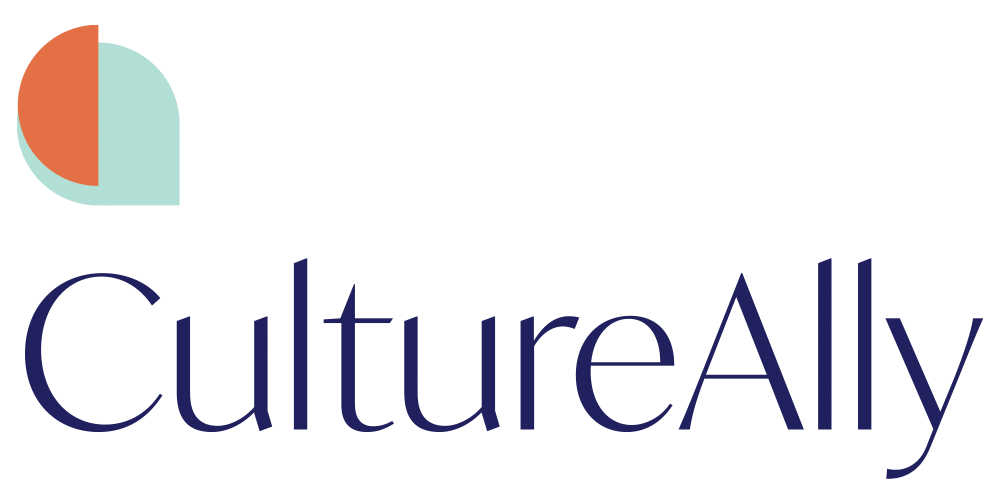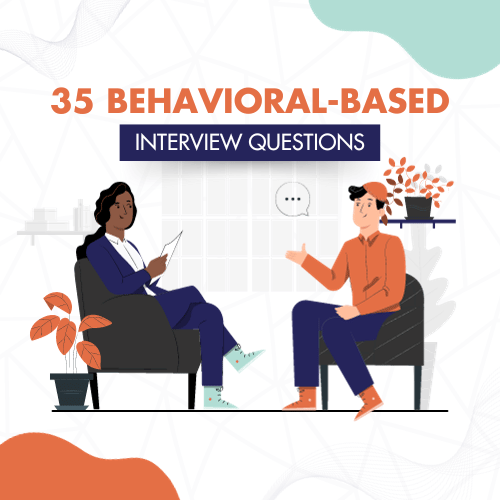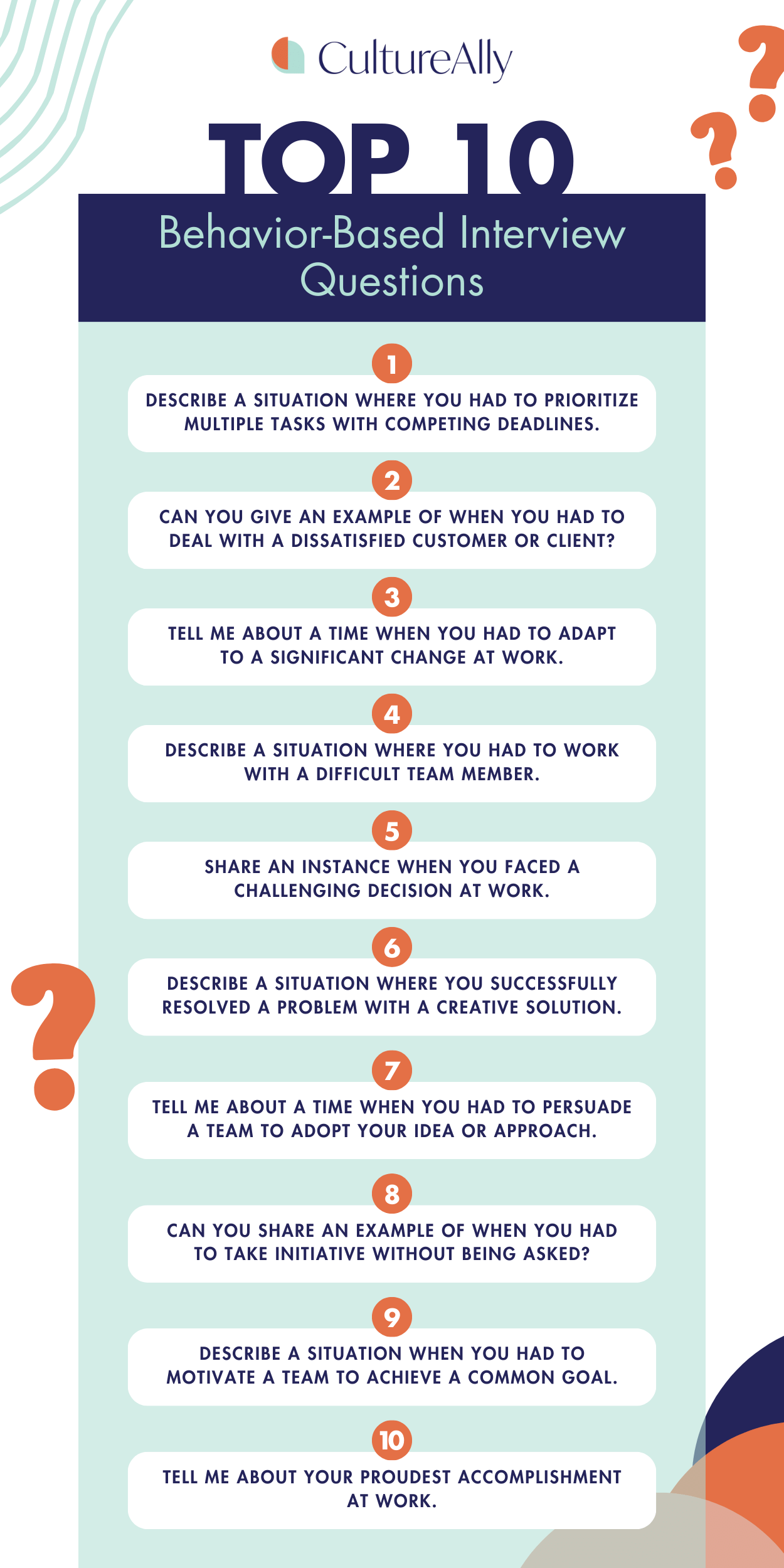35 Behavioral-Based Interview Questions
Behavioral interview questions are used by employers to evaluate a candidate’s suitability for a job by asking about past behaviors relevant to the challenges they may encounter in the position.
In this article we will discuss:
Importance of Behavioral Questions in Hiring
According to the Harvard Business Review, as much as 80% of employee turnover rates can be attributed to poor hiring decisions. This indicates the need for interviewers to be thorough in the hiring process and pose meaningful questions.
Behavioral questions are widely used in interviews due to their ability to prompt candidates to describe their past behavior, providing a glimpse into their future actions.
This approach allows interviewers to delve deeper into candidates' capabilities by exploring stories that highlight how they handled specific problems or scenarios.
Take for example, if an employer were to ask “What are your weaknesses?”, they might receive more generic responses that make it hard to compare which candidate is more suitable for the position.
By rephrasing the question to focus on past experiences, such as "Tell me about a time when you encountered XYZ; how did you overcome this conflict?"—with XYZ representing a relevant conflict to the job—employers can elicit more insightful responses, enabling them to make informed decisions during the hiring process.
The cost of turnover is significant, where losing one employee can cost an organization 1.5 to 2 times the employee’s salary. As such, using behavioral questions will help employers make an informed hiring decision based on tangible evidence rather than intuition.
Characteristics of Behavioral Questions
Behavioral questions contain the following key characteristics:
⌛Focus on Past Behavior
Instead of asking hypothetical or future-oriented questions, these questions ask candidates to recount specific instances from their past experiences.
🚩Situational Context
Behavioral questions often ask candidates to describe situations or scenarios they have encountered in the past. This helps employers understand how candidates approach and handle various challenges.
📏Specificity and Detail
The questions are designed to prompt detailed responses, encouraging candidates to provide specific examples, actions taken, and outcomes achieved.
Goals of Behavior-Based Questions
From the interviewer’s perspective, questions are asked to gain insight into a candidate’s:
⏩Problem-Solving Skills
Interviewers Want to Know: How candidates have approached and resolved problems in the past.
⏩Communication Skills
Interviewers Want to Know: How candidates articulate their thoughts, collaborate with others, and convey information.
⏩Adaptability
Interviewers Want to Know: How candidates handle change and navigate through challenging situations.
⏩Leadership and Teamwork
Interviewers Want to Know: How candidates lead, contribute to, or collaborate within a team.
⏩Cultural Fit
Interviewers Want to Know: Do the candidates’ values and beliefs align with those of the organization?
Behavioral vs. Technical Interview Questions
In addition to behavioral questions, candidates may encounter technical questions or case interview questions during the interview process.
Technical questions are designed to evaluate a candidate's expertise in areas directly relevant to the specific job requirements. They are often required for engineers, finance roles, and data analysts.
Thorough preparation is essential for success!
Below are resources containing commonly asked technical questions for these positions:
Case interviews are commonly required for consulting roles. In this format, candidates are presented with a business problem and are expected to solve it within a limited time frame. The primary goal is to assess the candidate's analytical and problem-solving skills.
For those preparing for case interviews, "Case In Point" is widely regarded in the consulting industry as a valuable resource. This book contains 40 strategy cases and offers a systematic approach to tackling even the most challenging questions, making it a valuable tool for mastering case interviews.
35 Behavioral-Based Interview Questions
Each of the following questions are bucketed into categories based on different required skills:
Resource Management
Can you describe a situation where you had to meet a tight deadline? How did you handle it?
2. Describe a situation where you had to prioritize multiple tasks with competing deadlines. How did you manage your time?
3. Tell me about a time when you had to work on a team project with tight resources. How did you manage constraints?
4. Can you give an example of when you had to work with limited information to make a decision? How did you approach it?
Customer Service
5. Can you give an example of when you had to deal with a dissatisfied customer or client? How did you handle the situation?
6. Tell me about a time when you had to meet a sales or revenue target. How did you approach achieving the goal?
7. Describe a situation where you had to handle confidential information responsibly. How did you maintain confidentiality?
Change Management
8. Tell me about a time when you had to adapt to a significant change at work. How did you approach it?
9. Describe an instance when you navigated a learning curve to effectively perform your responsibilities.
10. Describe an instance where you played a key role in implementing a significant change within your team or organization.
Conflict Management
11. Describe a situation where you had to work with a difficult team member. How did you resolve the conflict?
12. Can you share an example of a project that didn't go as planned? What did you do to address the challenges?
13. Tell me about a time when you had to lead a team through a challenging project. What strategies did you use?
14. Can you share an example of when you had to navigate a disagreement within your team? How did you handle it?
15. Share an instance when you faced a challenging decision at work. Outline the steps you took in arriving at and implementing that decision.
16. Can you share an example of when you had to manage a project with competing stakeholder interests? How did you navigate it?
17. Can you give an example of when you had to handle a high-pressure situation at work? How did you stay calm under pressure?
18. Tell me about a time when you made a mistake. Explain the steps you took to resolve the issue.
Creativity
19. Describe a situation where you successfully resolved a problem with a creative solution.
20. Tell me about the best idea you’ve come up with for a team project and the results of its implementation.
21. Tell me about a time when you took a calculated risk to implement a creative solution to a problem at work. What was the situation, the innovative approach you adopted, and what were the outcomes?
Communication
22. Tell me about a time when you had to persuade a team to adopt your idea or approach. How did you go about it?
23. Describe a situation where you had to overcome resistance to change within your team or organization.
24. Can you share an example of when you had to work with a cross-functional team? How did you ensure collaboration?
25. Describe a situation where you had to deliver constructive feedback to a colleague or team member.
26. Tell me about a time when you had to influence a decision without having formal authority. How did you achieve this?
27. Tell me about a time when you needed information or work from someone who wasn’t responsive. What did you do?
Leadership
28. Can you share an example of when you had to take initiative without being asked? What was the outcome?
29. Describe a situation where you had to mentor a team member to improve their performance.
30. Can you share an example of when you had to delegate tasks to team members? How did you ensure effective delegation?
31. Tell me about a time when you had to motivate a team to achieve a common goal. What strategies did you use?
Motivation & Values
32. Describe a career goal you set for yourself and the initiatives you took to accomplish it.
33. Tell me about your proudest accomplishment at work.
34. Tell me about a time when you experienced burnout at work. What caused it and how did you recover from burnout?
35. Detail any initiatives you have participated in beyond your regular job duties. This might include engagement in employee resource groups, volunteering, or mentorship activities.
How to Conduct an Inclusive Interview
As interviews can be extremely daunting for candidates, employers have a responsibility to create an inclusive interview process. Preparation extends beyond having a list of behavioral questions ready to ask candidates.
Here are 4 tips to ensure fairness and diversity in the hiring process:
✅Create a diverse interview panel
Ensure diversity within the interview panel, considering gender, race, and background representation. Evaluate interview panel members based on their contributions to diversity efforts within the organization. This ensures that those conducting interviews have actively participated in cultivating an inclusive culture, reducing the likelihood of bias toward candidates.
✅Use inclusive language
Utilize neutral terminology in both the job posting and the interview process that does not presume gender, race, or background. For instance, employ person-centered language such as "person with a disability" instead of "disabled," prioritizing individuals over their identity.
Inclusive language not only helps employers avoid potential legal issues related to discriminatory hiring practices but also demonstrates organizational values centered on creating an environment where everyone is perceived as respected and valued.
✅Train interviewers on unconscious bias
Provide training for interviewers on recognizing and mitigating unconscious bias. Affinity bias, a particular form of unconscious bias, can influence interviewers to favor candidates who share similarities in hobbies, alma maters, or other characteristics. Developing awareness of how biases may manifest enables interviewers to make more impartial and objective decisions in the hiring process.
✅Offer accommodations
These accommodations may involve selecting interview locations that are wheelchair-accessible, providing alternatives like video or phone interviews, and permitting candidates to use assistive devices. By implementing such accommodations, you create an inclusive and accessible interview process that respects the diverse needs of candidates.
How to Prepare for Behavioral Interviews
Whether you're a candidate or an interviewer giving guidance, you might be wondering what is the best way to effectively prepare for this type of interview.
Here are three tips to recommend to candidates or apply yourself if you're navigating the interview process.
Tip #1 - Prepare stories based on the job description
Think about work situations that showcase how you have demonstrated the skills or fulfilled responsibilities relevant to the position you’re seeking. Having a list of stories prepared beforehand will allow you to easily recall and share these situations when asked by the interviewer.
Here is a template with prompts to help you build your story toolbox.
Tip #2 - Use STAR
Answers to behavioral questions should be structured using the STAR technique which stands for:
⭐Situation
Set the scene by describing the situation you were in. Provide enough detail for the interviewer to understand the background of your example.
Example: "In my previous role as a project manager, we were tasked with implementing a new software system to improve team collaboration."
⭐Task
Explain the specific task or goal you needed to accomplish. What was the objective or challenge you were facing?
Example: "The goal was to implement the software system within a tight deadline and ensure a smooth transition for all team members."
⭐Action
Describe the actions you took to address the situation and accomplish the task. Focus on your individual contributions and highlight the skills and competencies you demonstrated.
Example: "I conducted thorough research to identify the most suitable software, collaborated with the IT team for seamless integration, and provided training sessions to ensure all team members were comfortable with the new system."
⭐Result
Conclude by explaining the positive accomplishments of your actions. Use quantifiable measures if possible.
Example: "As a result of the implementation, we saw a 20% improvement in team collaboration, a 15% increase in project efficiency, and positive feedback from team members on the ease of use."
Tip #3: Practice
Practice telling your stories in a concise and compelling manner to a friend or mentor. This allows you to receive external feedback on your storytelling and delivery and make improvements for the actual interview.
Additionally, consider leveraging interview preparation software, such as Interview Prep AI. This app simulates real-life interviews, where you engage with its AI to receive instant feedback providing a valuable tool for strengthening your interview skills.
Final Thoughts
Behavioral-based interview questions play a crucial role in the hiring process by offering unique insights into a candidate's past actions and potential future contributions. Understanding a candidate's approach to challenges, collaboration, and cultural fit increases the likelihood of selecting individuals who will thrive in the organization.
Beyond posing the right behavioral questions, interviewers should prioritize creating an inclusive environment where candidates feel valued, utilizing neutral language, and incorporating diverse interview panels to mitigate biases.
For candidates, meticulous preparation is essential for navigating behavioral interviews successfully. Crafting well-structured stories, practicing with peers or mentors, and utilizing interview preparation tools contribute to a comprehensive strategy for a successful interview experience.






